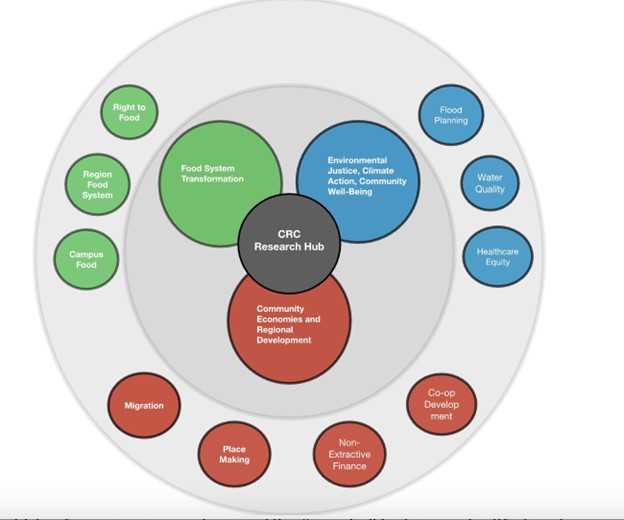The West Virginia University (WVU) Center for Resilient Communities advances community engaged research and education programs to generate knowledge and raise up human resources for more just, equitable and vibrant communities in West Virginia, the greater Appalachian region, and the world. Our aim is to foster a positive spirit, support collective inquiry, elevate new grassroots leadership, and to encourage people to look to themselves, rather than outside experts to promote community well-being in our region.
The WVU Center for Resilient Communities (CRC) is honored to serve as host of a Knowledge for Change (K4C) Hub in collaboration with the UNESCO Chair in Community-Based Research and Social Responsibility in Higher Education. The WVU CRC joins 23 other K4C Hubs in 14 countries around the world. The purpose of a Knowledge for Change Hub is to provide education, training and mentorship for community-based participatory research and to develop research capacities for the co-creation of knowledge by practitioners, youth, community groups and academics as a means to achieve the United Nations Sustainable Development Goals.
The WVU CRC has developed, with our community partners, three core areas of inquiry and ongoing participatory research efforts. These three areas were developed based on a decade of work in West Virginia. We hope these areas may align with other K4C Hubs around the world and serve as a starting point for future growth.
- Community Economies and Sustainable Regional Development: The CRC has explored the role of community economies in building local wealth and promoting social and economic justice and sustainable development at regional, national, and global levels. Our inquiry is rooted in a vision of non-extractive wealth building where economic cooperation, community wellbeing, place- making, racial diversity, gender equity, and shared prosperity form the basis of everyday life and livelihoods in small towns and cities.
- Environmental Justice, Climate Action and Community Wellbeing: The CRC has explored issues of health disparities, environmental hazards, water quality and flood disasters related to past environmental degradation and ongoing climate impacts in WV and Appalachia. Our inquiry is rooted in a vision of environmental justice, democratic participation, and vibrant communities that are prepared to address environmental degradation, water insecurity, climate risks and promote the health and wellbeing of all.
- Food System Transformation: The CRC has explored the role the food system plays in building community resilience at a local, regional, and even global scale. Our theories of change are focused on challenging food system inequalities, supporting cooperative structures of equitable food system development, supporting agroecology practices and methods that mitigate climate change and exploitative labor, and work towards food sovereignty and the “right to food” in Appalachia and beyond.

Current Programs:
- Cooperative Action Research and Education Lab Program (CARE): CARE Labs are the proverbial “makeshop” of the CRC where long-term community engaged research and education come together to respond to the needs of individuals, institutions and communities in our region. CARE Labs establish the relationship between the collective research and the Areas of Collective Inquiry and create a semi-permanent space for all CRC stakeholders to engage or organize all research activities.
- Community Partnership Program: The Center builds long term community partnerships through formal cooperative agreements and continues to work with individuals, community organizations and other representative bodies to co-create knowledge and reflect on ways to foster meaningful, long-term relationships that enable mutual accountability and understanding.
- The Community Engaged Research Training Program: The CERT program includes a sequence of courses that engages community partners, graduate students and advanced undergraduates in the discourses, theories and practices of community engaged research for social, economic and environmental justice.
- The Sustainable Development Internship: In collaboration with community partners, this program provides community-based participatory research experiences for undergraduate students through a semester-long internship program and seminar. Community partners and graduate student mentors are a critical part of this program.
- Community GIS Program: This program houses community-relevant data, supports mapping efforts, and democratizes access to information for the continued generation and application of knowledge with community partners.
West Virgnia Mentors who completed the K4C MTP training include:
- Maria del Guadalupe (Lupe) Davidson, West Virginia University, West Virginia lupe.davidson@mail.wvu.edu
- Cynthia Gorman, West Virginia University, West Virginia- Cynthia.Gorman@mail.wvu.edu
- Amy Jo Hutchison, Our Future West Virginia, West Virginia- amyjo@ourfuturewv.org
- Shanequa Smith, WVU Center for Resilient Communities, West Virginia- drshanequasmith@gmail.com
- Jessica (Jessie) Wilkerson, West Virginia University, West Virginia- jessica.wilkerson@mail.wvu.edu
Bradley Wilson, West Virginia University, West Virginia- Bradley.Wilson@mail.wvu.edu




